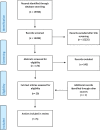Is mental health staff training in de-escalation techniques effective in reducing violent incidents in forensic psychiatric settings? - A systematic review of the literature
- PMID: 37046228
- PMCID: PMC10099889
- DOI: 10.1186/s12888-023-04714-y
Is mental health staff training in de-escalation techniques effective in reducing violent incidents in forensic psychiatric settings? - A systematic review of the literature
Abstract
Background: Inpatient violence is a relevant issue in forensic psychiatric settings. Relevant guidelines recommend that restrictive measures are to be used exclusively if de-escalation and other preventive strategies have failed and there is a risk of harm to patients or staff if no action is taken. However, restrictive measures are untherapeutic and can be harmful. In order to enable staff to intervene before inpatient violence or other serious incidents occur and thus to avoid restrictive measures, mental health staff training programs including de-escalation components are being adopted in general as well as forensic mental health settings. There is growing evidence for the efficacy of mental health staff training in de-escalation techniques in the field of general psychiatry. However, there are no reviews evaluating the effectiveness of these interventions in reducing violent incidents in forensic psychiatric settings. Here we present the first literature review on the effectiveness staff training in de-escalation techniques in the field of forensic psychiatry.
Method: We searched relevant databases for original research on the effectiveness of reducing violence in forensic psychiatric settings. Studies were included if they investigated staff training programs with de-escalation techniques in forensic mental health settings.
Results: A total of 5 relevant studies were identified. None of the studies was a randomized controlled trial. Four studies were before and after comparisons without control group. A one group post-test-only design was used in one study. Methodological quality was low. The maximum sample size was 112 participants. Results indicated no relevant impact of mental health staff training in de-escalation techniques on the rate of violent incidents in forensic psychiatric wards. However, staff seemed to feel safer following the training. Results have to be interpreted cautiously due to several methodological and content-related limitations.
Discussion: Evidence for the effectiveness of staff training in de-escalation techniques on reducing verbal and physical aggression in forensic settings remains very limited. The existing definitions of terms like de-escalation, de-escalation training and de-escalation techniques in the healthcare context appear rather vague. Although some positive changes are reported across a variety of outcome measures it remains unclear to what extent staff training in de-esclation techniques contributes to a reduction in aggressive incidents and restrictive measures in forensic psychiatry. The clinical implications of this review are therefore limited. Yet, an important implication for future research is that a more comprehensive approach might prove worthwhile. Conducting a further review integrating a wide range of complex interventions aimed at the reduction of inpatient violence rather than focusing on de-escalation only, might be a worthwhile approach.
Keywords: De-escalation; Forensic psychiatry; Inpatient violence; Staff training.
© 2023. The Author(s).
Conflict of interest statement
The authors declare no competing interests.
Similar articles
-
Development and evaluation of a de-escalation training intervention in adult acute and forensic units: the EDITION systematic review and feasibility trial.Health Technol Assess. 2024 Jan;28(3):1-120. doi: 10.3310/FGGW6874. Health Technol Assess. 2024. PMID: 38343036 Free PMC article.
-
Evaluation of a novel co-designed and co-delivered training package to de-escalate violence and aggression in UK acute inpatient, PICU and forensic mental health settings.J Psychiatr Ment Health Nurs. 2024 Dec;31(6):1145-1154. doi: 10.1111/jpm.13074. Epub 2024 Jun 22. J Psychiatr Ment Health Nurs. 2024. PMID: 38922757
-
De-escalation of conflict in forensic mental health inpatient settings: a Theoretical Domains Framework-informed qualitative investigation of staff and patient perspectives.BMC Psychol. 2022 Feb 15;10(1):30. doi: 10.1186/s40359-022-00735-6. BMC Psychol. 2022. PMID: 35168682 Free PMC article.
-
The support-control continuum: An investigation of staff perspectives on factors influencing the success or failure of de-escalation techniques for the management of violence and aggression in mental health settings.Int J Nurs Stud. 2018 Jan;77:197-206. doi: 10.1016/j.ijnurstu.2017.10.002. Epub 2017 Oct 6. Int J Nurs Stud. 2018. PMID: 29100202
-
A narrative review of the effectiveness of aggression management training programs for psychiatric hospital staff.J Forensic Nurs. 2010 Spring;6(1):15-28. doi: 10.1111/j.1939-3938.2009.01061.x. J Forensic Nurs. 2010. PMID: 20201912 Review.
Cited by
-
Intervening factors between risk of violence and aggressive behaviours among forensic inpatients: a scoping review.BMC Psychol. 2024 Mar 15;12(1):155. doi: 10.1186/s40359-024-01649-1. BMC Psychol. 2024. PMID: 38491550 Free PMC article.
-
Education and training interventions for healthcare workers to prevent sexual harassment.Cochrane Database Syst Rev. 2025 Feb 6;2(2):CD016096. doi: 10.1002/14651858.CD016096. Cochrane Database Syst Rev. 2025. PMID: 39912450 Free PMC article.
-
'Fleeing' as a Strategy for Navigating Resistance in Patient Encounters within Forensic Care.Healthcare (Basel). 2023 Nov 2;11(21):2890. doi: 10.3390/healthcare11212890. Healthcare (Basel). 2023. PMID: 37958034 Free PMC article.
References
-
- Bowers L. A model of de-escalation. Ment Health Pract. 2014;17(9):36–37. doi: 10.7748/mhp.17.9.36.e924. - DOI
Publication types
MeSH terms
LinkOut - more resources
Full Text Sources
Medical


